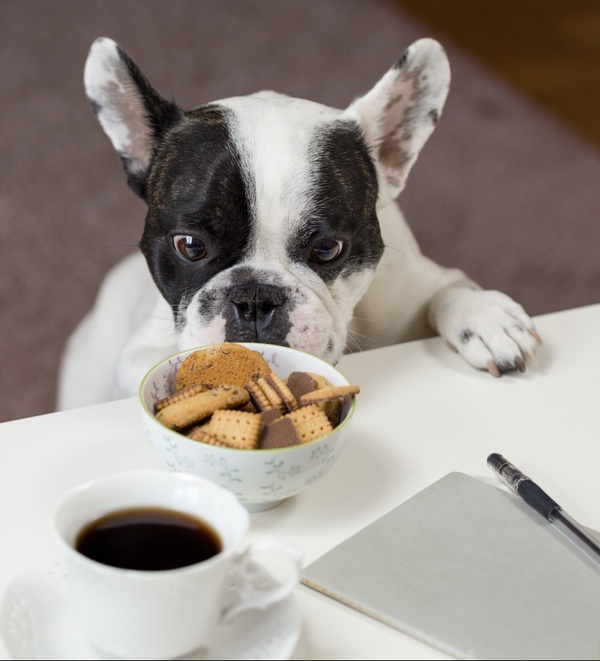
What Foods Should My Dog Never Eat?
As pet parents, we already share our lives and our love with our dogs, so giving them a bite of whatever we’re eating doesn’t seem like a big deal. If you’ve found yourself locked in a staring contest with your dog over dinner, we get it. Nothing is a match for puppy eyes. But there are numerous human foods that aren’t safe for dogs, and if eaten, can result in potentially life-threatening emergencies.
Let’s discuss some of the foods that dogs should never eat, and why they’re dangerous for your pup. It’s important to note that this is not a definitive list of prohibited foods. If you have any doubts about feeding your dog something, stick to dog food and treats. If you suspect that they’ve already eaten a potentially toxic ingredient, seek emergency care immediately.
Chocolate
Most pet parents know that chocolate in any form — cocoa powder, candy bar, baked goods, dark chocolate, and more — is bad for dogs. Chocolate contains chemicals called methylxanthines, namely theobromine, that are extremely toxic for dogs and stop their metabolic process. Even a small amount of chocolate can cause upset stomach, diarrhea, and vomiting and large amounts can have much more severe consequences like seizures, irregular heart function, and even death. Never leave chocolate or chocolate products where your dog can access them. If your dog does ingest chocolate, immediately contact your vet for emergency care or call a pet poison control hotline.
Macadamia nuts
Generally speaking, high-fat nuts of any kind are difficult for your dog to digest. Macadamia nuts take this a step further and are actually highly poisonous for dogs. If eaten, they can cause vomiting, increased body temperature, lethargy, tremors, and loss of limb control. Because they can also impact your dog’s nervous system, macadamias are particularly dangerous and should never be fed to your pup.
SEE ALSO: 7 Holiday Foods to Avoid Feeding Your Pet
Grapes & raisins
Grapes and their wrinkly relatives, raisins, are highly toxic to most dogs — but we haven’t yet identified what exactly makes them so poisonous. What we do know is that in serious cases, eating grapes or raisins can damage their kidneys and cause sudden renal failure. You may have caught that “most dogs” bit in the first sentence. While it’s true that kidney failure does not occur in every dog that eats a grape, all dogs still have adverse reactions to them, even if it’s not readily apparent. Since we’re still determining what component of grapes and raisins makes them so dangerous to dogs, it’s essential to keep your pup away from any food or beverage containing the fruit.
Garlic, Onions, & Chives
Garlic, onions, and chives are members of the allium family, and are unsafe for dogs. Garlic is five times more toxic than other allium plants, which can be particularly dangerous since it’s a mainstay of many cuisines. Whether raw, cooked, or dehydrated into spices, alliums contain a substance that dogs can’t digest and are considered toxic, depending on the amount ingested. Eating alliums can harm a dog's red blood cells, which can lead to liver damage, anemia, diarrhea, low blood pressure, and elevated heart rate and heart issues.
Xylitol
Xylitol is an artificial sweetener that can be found in many sugar-free products like gum and candy, baked goods, and even certain brands of peanut butter. It’s also a surprisingly common guest star in personal care products like toothpaste, mouthwash, select medications, lotions, and deodorant. If eaten, even small quantities, it can cause your dog's blood sugar to drop, leading to weakness, vomiting, coma, and even liver failure. Be sure to keep products containing xylitol well out of the reach of your dog, and always double-check the label for ingredients.
SEE ALSO: Can Dogs Eat Candy?
Emergency response
Even the most vigilant pet parent can’t prevent their dog from getting into foods that they shouldn’t be eating. If your pet eats something that you suspect may be toxic or may cause a blockage of their digestive system, call your vet immediately or contact a pet poison control helpline (the FDA recommends Pet Poison Hotline: 855-764-7661) for expert, emergency advice and care.
Sources:
- https://www.ccspca.com/blog-spca/education/foods-dogs-cant-eat/
- https://www.humanesociety.org/resources/foods-can-be-poisonous-pets
- https://www.akc.org/expert-advice/nutrition/dont-feed-your-dog-these-foods-fda-warns/
- http://mentalfloss.com/article/30206/why-chocolate-bad-dogs
- https://www.caninejournal.com/foods-not-to-feed-dog/
- https://www.purina.com/articles/dog/nutrition/can-dogs-eat-grapes
- https://www.petmd.com/dog/emergency/poisoning-toxicity/6-dangerous-and-surprising-items-contain-xylitol